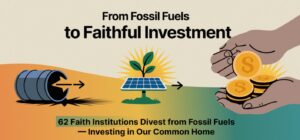
Sixty two institutions—from Catholic dioceses to Protestant banks—have announced their decision to divest from fossil fuels, sending a clear signal to world leaders: it’s time to end the fossil fuel era and embrace a future rooted in justice and care for our Common Home.
This moment represents one of the largest faith-based divestment announcements to date, showing how commitment can inspire real-world transformation.
What is fossil fuel divestment?
Divestment means withdrawing investments from companies involved in the extraction or production of fossil fuels like coal, oil, and gas. For faith institutions, it’s more than a financial decision—it’s a moral and spiritual commitment.
By divesting, they are ensuring that their resources no longer fund the industries most responsible for climate change, biodiversity loss, and environmental injustice.
Instead, many are redirecting funds toward renewable energy, sustainable agriculture, and community projects that heal both people and the planet—living out the message of Laudato Si’, that “everything is connected.”
Who’s taking the lead?
This wave of divestment spans continents and denominations.
Among the new signatories are five Catholic dioceses—four in Italy and one in Canada—along with Catholic and Protestant banks in Germany, and 42 members of the Arbeitskreis Kirchlicher Investoren (AKI), a network of Protestant institutional investors.
For the first time, a Catholic diocese in Canada has joined the global divestment movement—a remarkable step from one of the world’s largest fossil fuel-producing nations.
In Italy, where heatwaves and floods have ravaged communities, Catholic leaders are sending a message of hope and consistency: our faith must align with our actions. Among the faith leaders speaking out is Cardinal Augusto Paolo Lojudice, Archbishop of Siena-Colle di Val d’Elsa-Montalcino and Bishop of Montepulciano-Chiusi-Pienza.
In Germany, Christians for Future helped coordinate the announcement, showing that collective faith-driven advocacy can influence financial institutions. The Jesuits in Central Europe have also committed to fully divest, demonstrating that major religious orders are embracing transformative change.
A moral imperative
At the heart of this decision lies a deep moral call—what Pope Leo XIV recently described as “a duty of justice, love, and hope for future generations.”
Faith leaders across the globe are making clear that climate action is not optional. It’s an act of love for creation and solidarity with those who suffer most from ecological harm.
Bishops from Africa, Asia, Latin America, and the Caribbean have joined their voices in urging an end to fossil fuels, reminding us that the ecological crisis is also a moral and social crisis.
As the World Council of Churches declared, this is a “kairos moment”—a decisive time in history when faith must be translated into bold action.
By divesting, these 62 institutions remind us that our economic choices reflect our values. In refusing to profit from companies fueling the climate crisis, they choose to invest in life.
The bigger picture: faith leads where politics lags
More than 1,700 institutions worldwide, representing over $40 trillion in assets, have already made divestment commitments. Over 600 of them are faith-based, showing how religious organizations are outpacing governments in responding to the climate crisis.
While global governments continue to fall short on climate action, faith communities are implementing concrete action—what we might call People’s Determined Contributions (PDCs)—a living example of ecological conversion in motion.
This leadership stands in stark contrast to the actions of fossil fuel giants like TotalEnergies and ExxonMobil, still expanding oil projects in Africa and the Amazon despite the International Energy Agency’s clear warning: no new oil and gas fields are compatible with a 1.5°C world.
Faith-based divestment is not only prophetic—it’s practical. It reclaims the power of finance as a tool for good, proving that the economy can serve life, not the other way around.
A hopeful horizon
Each institution that divests from fossil fuels adds one more hand pushing the boulder of climate action down the hill. As Dr. Katharine Hayhoe says, “Every action matters. Every choice matters.”
Through their decision, faith institutions are saying no to destruction and yes to renewal—to clean energy, justice, and a shared future built on solidarity.
Their message to the world is simple: caring for creation is not just a belief—it’s a commitment we live out every day.
As Pope Francis has called us to “hear both the cry of the earth and the cry of the poor,” these 62 institutions have shown us what that looks like in action. Now, it’s our turn.
Whether through advocacy, prayer, or local initiatives, we can all be part of this growing movement to heal our Common Home.





